Serving 611 students in grades Kindergarten-8, Castelar Street Elementary School ranks in the top 30% of all schools in California for overall test scores (math proficiency is top 20%, and reading proficiency is top 20%).
The percentage of students achieving proficiency in math is 51% (which is higher than the California state average of 33%). The percentage of students achieving proficiency in reading/language arts is 53% (which is higher than the California state average of 47%).
The student:teacher ratio of 20:1 is lower than the California state level of 21:1.
Minority enrollment is 91% of the student body (majority Asian), which is higher than the California state average of 80% (majority Hispanic and Asian).
Quick Stats (2025)
- Grades: Kindergarten-8
- Enrollment: 611 students
- Student:Teacher Ratio: 20:1
- Minority Enrollment: 91%
- Overall Testing Rank: Top 30% in CA
- Math Proficiency: 51% (Top 20%)
- Reading Proficiency: 53% (Top 50%)
- Science Proficiency: 40-44% (Top 30%)
- Source: National Center for Education Statistics (NCES), CA Dept. of Education
Top Rankings
Castelar Street Elementary School ranks among the top 20% of public schools in California for:
Category
Attribute
Math Proficiency
School Overview
Castelar Street Elementary School's student population of 611 students has stayed relatively flat over five school years.
The teacher population of 30 teachers has grown by 15% over five school years.
Grades Offered
Grades Kindergarten-8
Total Students
611 students
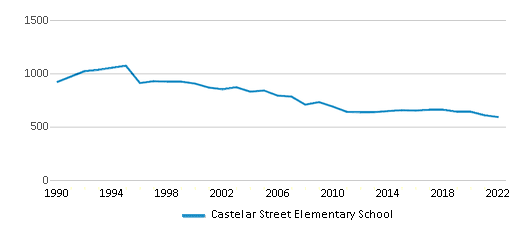
Gender %
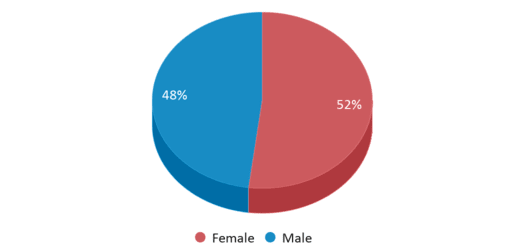
Total Classroom Teachers
30 teachers
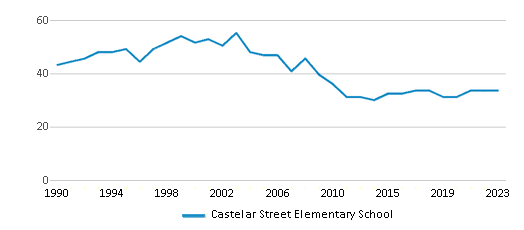
Students by Grade
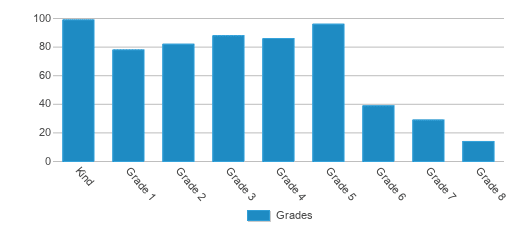
School Calendar
School Rankings
Castelar Street Elementary School ranks within the top 30% of all 9,602 schools in California (based off of combined math and reading proficiency testing data).
The diversity score of Castelar Street Elementary School is 0.64, which is more than the diversity score at state average of 0.63. The school's diversity has stayed relatively flat over five school years.
Overall Testing Rank
#2280 out of 9602 schools
(Top 30%)
(Top 30%)
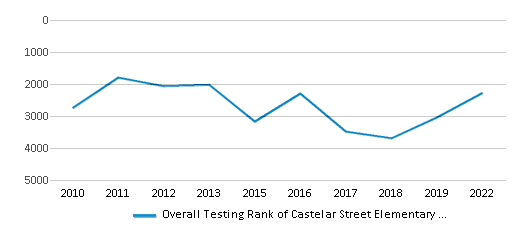
Math Test Scores (% Proficient)
51%
33%
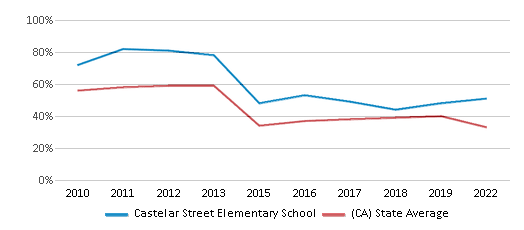
Reading/Language Arts Test Scores (% Proficient)
53%
47%
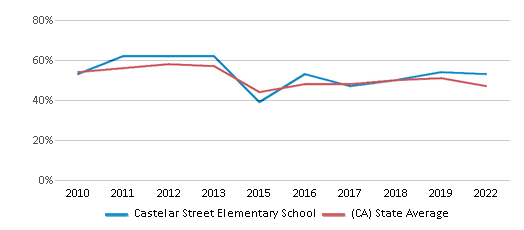
Science Test Scores (% Proficient)
40-44%
29%
Student : Teacher Ratio
20:1
21:1
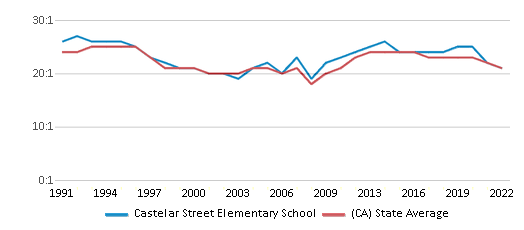
American Indian
n/a
1%
Asian
52%
12%
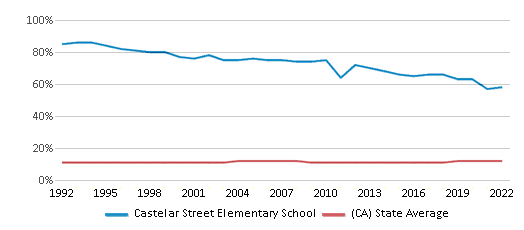
Hispanic
29%
56%
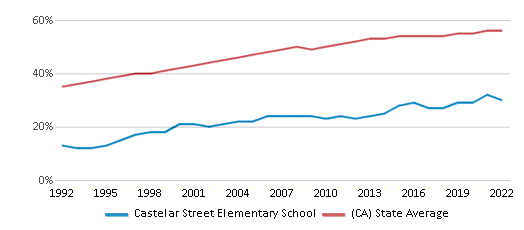
Black
4%
5%
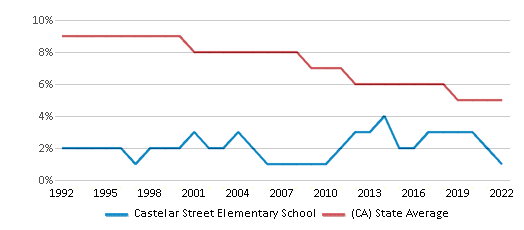
White
9%
20%
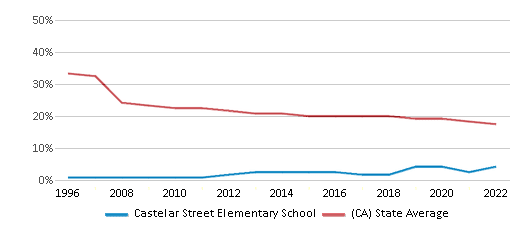
Hawaiian
n/a
n/a
Two or more races
6%
6%
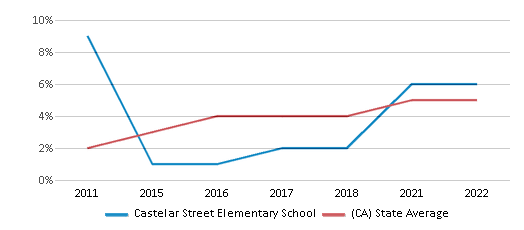
All Ethnic Groups
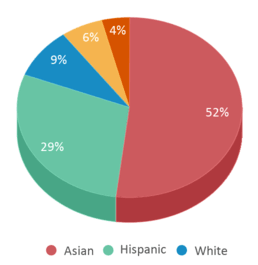
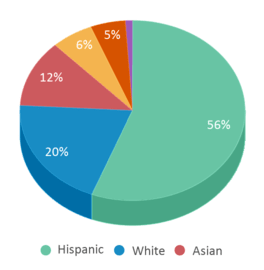
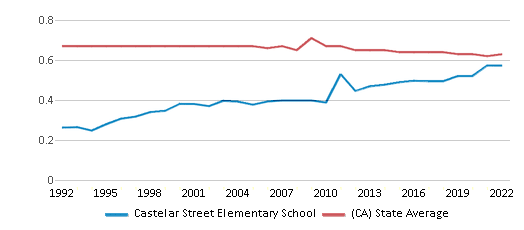
Eligible for Free Lunch
80%
54%
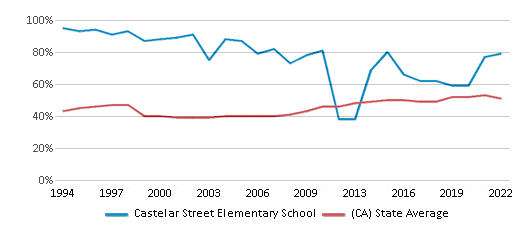
Eligible for Reduced Lunch
5%
8%
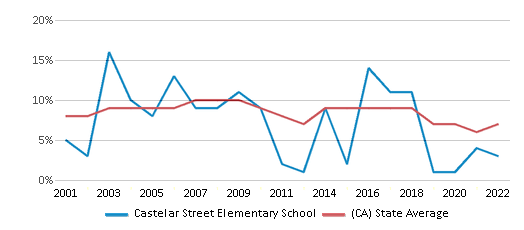
School Statewide Testing
School District Name
Source: National Center for Education Statistics (NCES), CA Dept. of Education
Profile last updated: 02/09/2025
Frequently Asked Questions
What is Castelar Street Elementary School's ranking?
Castelar Street Elementary School is ranked #2280 out of 9,602 schools, which ranks it among the top 30% of public schools in California.
What schools are Castelar Street Elementary School often compared to?
Castelar Street Elementary Schoolis often viewed alongside schools like Solano Avenue Elementary School, Martha Baldwin Elementary School by visitors of our site.
What percent of students have achieved state testing proficiency in math and reading?
51% of students have achieved math proficiency (compared to the 33% CA state average), while 53% of students have achieved reading proficiency (compared to the 47% CA state average).
How many students attend Castelar Street Elementary School?
611 students attend Castelar Street Elementary School.
What is the racial composition of the student body?
52% of Castelar Street Elementary School students are Asian, 29% of students are Hispanic, 9% of students are White, 6% of students are Two or more races, and 4% of students are Black.
What is the student:teacher ratio of Castelar Street Elementary School?
Castelar Street Elementary School has a student ration of 20:1, which is lower than the California state average of 21:1.
What grades does Castelar Street Elementary School offer ?
Castelar Street Elementary School offers enrollment in grades Kindergarten-8
What school district is Castelar Street Elementary School part of?
Castelar Street Elementary School is part of Los Angeles Unified School District.
In what neighborhood is Castelar Street Elementary School located?
Castelar Street Elementary School is located in the Central LA neighborhood of Los Angeles, CA. There are 62 other public schools located in Central LA.
School Reviews
5 6/10/2017
I have attended Castelar Elementary School from K-4th Grade. I've had excellent teachers that were ASIANS and spoke fluent English who helped shape me into what I am today. Thank you Castelar teachers, who were extremely dedicated, for contributing to my success.Regarding the comment above posted by a concerned parent-I have not heard of such a thing happening in this school.Keep in mind that there is two columns for grading: The first column is academic performance and the second is for the student's effort.Looking at the situation you presented, you are probably looking at the effort/participation column.
3 12/6/2016
My son goes to this school now and he is in a dual (Chinese & English) language class. He gets average to below average homework scores but the teacher gives him a lot of 4s (4 being the highest) on his report card. I am not sure if my son is really learning English and if he has really earned that score of 4. The teacher has told me on the phone that she has a lot to get through and to teach. However, many second language learner like my son learn English at a different and slower pace than those who are not second language learner. I have met the teacher at my first parent teacher conference and my impression is not so good.This school has changed a lot over the years ... Many teachers are not native English teachers and most of them like my son's English teacher are Asian. To me, the school is only an average school.
Review Castelar Street Elementary School. Reviews should be a few sentences in length. Please include any comments on:
- Quality of academic programs, teachers, and facilities
- Availability of music, art, sports and other extracurricular activities
Recent Articles

What Is A Charter School?
Explore the world of charter schools in this comprehensive guide. Learn about their history, how they operate, and the pros and cons of this educational innovation. Discover key facts about charter schools, including admission policies, demographics, and funding, as well as what to look for when considering a charter school for your child.

10 Reasons Why High School Sports Benefit Students
Discover the 10 compelling reasons why high school sports are beneficial for students. This comprehensive article explores how athletics enhance academic performance, foster personal growth, and develop crucial life skills. From improved fitness and time management to leadership development and community representation, learn why participating in high school sports can be a game-changer for students' overall success and well-being.

February 05, 2025
Understanding the U.S. Department of Education: Structure, Impact, and EvolutionWe explore how the Department of Education shapes American education, from its cabinet-level leadership to its impact on millions of students, written for general audiences seeking clarity on this vital institution.





